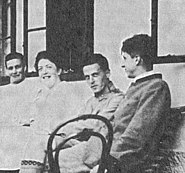Ludwig Wittgenstein's philosophy of mathematics
| Part of a series on |
| Ludwig Wittgenstein |
|---|
 |
Ludwig Wittgenstein considered his chief contribution to be in the philosophy of mathematics, a topic to which he devoted much of his work between 1929 and 1944.[1] As with his philosophy of language, Wittgenstein's views on mathematics evolved from the period of the Tractatus Logico-Philosophicus: with him changing from logicism (which was endorsed by his mentor Bertrand Russell) towards a general anti-foundationalism and constructivism that was not readily accepted by the mathematical community. The success of Wittgenstein's general philosophy has tended to displace the real debates on more technical issues.[citation needed]
His Remarks on the Foundations of Mathematics contains his compiled views, notably a controversial repudiation of Gödel's incompleteness theorems.
Tractatus[]
Wittgenstein's initial conception of mathematics was logicist and even formalist.[1] The Tractatus described the propositions of logic as a series of tautologies derived from syntactic manipulation, and without the pictorial force of elementary propositions depicting states of affairs obtaining in the world.
Wittgenstein asserted that “[t]he logic of the world, which is shown in tautologies by the propositions of logic, is shown in equations by mathematics” (6.22) and further that “Mathematics is a method of logic” (6.234).
Philosophy of mathematics, post-1929[]
During the 1920s Wittgenstein turned away from philosophical matters but his interest in mathematics was rekindled when he attended in Vienna a lecture by the intuitionist L. E. J. Brouwer. After 1929, his primary mathematical preoccupation entailed resolving the account of logical necessity he had articulated in the Tractatus Logico-Philosophicus—an issue which had been fiercely pressed by Frank P. Ramsey.[2] Wittgenstein's initial response, Some Remarks on Logical Form, was the only academic paper he published during his lifetime, and marked the beginnings of a departure from the ideal language philosophy and correspondence theory of truth of the Tractatus.
The Lectures on the Foundations of mathematics[]
During the two terms of 1938/9 Wittgenstein lectured without any notes before students for two hours twice a week. From four sets of notes made during the lectures a text has been created, presenting Wittgenstein's views at that time.[3]
The Remarks on the Foundations of mathematics (1937–44)[]
An editorial team prepared the edition of Wittgenstein's Remarks on the Foundations of mathematics from the manuscript notes he made during the years 1937-44. The material has been arranged in chronological order, allowing to observe some changes of emphasis or interest in Wittgenstein's views over the years.[4]
References[]
- ^ Jump up to: a b Roydich V, Wittgenstein's Philosophy of Mathematics, The Stanford Encyclopedia of Philosophy
- ^ S. G. Shanker, (1987), Wittgenstein and the Turning Point in the Philosophy of Mathematics, [1], ISBN 978-0-88706-482-1
- ^ (1976), Wittgenstein’s Lectures on the Foundations of Mathematics, ed. Cora Diamond, Ithaca, N.Y.: Cornell University Press.
- ^ Remarks on the Foundations of mathematics (1978) Revised Edition, Oxford: Basil Blackwell, G.H. von Wright, R. Rhees and G.E.M. Anscombe (eds.); translated by G.E.M Anscombe.
- Crispin Wright, 1980, Wittgenstein on the Foundations of Mathematics, Harvard University Press, ISBN 0674953851
- Pasquale Frascolla, 1994, Wittgenstein's Philosophy of Mathematics, Routledge
External links[]
- Sorin Bangu, Ludwig Wittgenstein: Later Philosophy of Mathematics , IEP
- Victor Rodych, Wittgenstein's Philosophy of Mathematics, The Stanford Encyclopedia of Philosophy
- Ludwig Wittgenstein
- Philosophy of mathematics